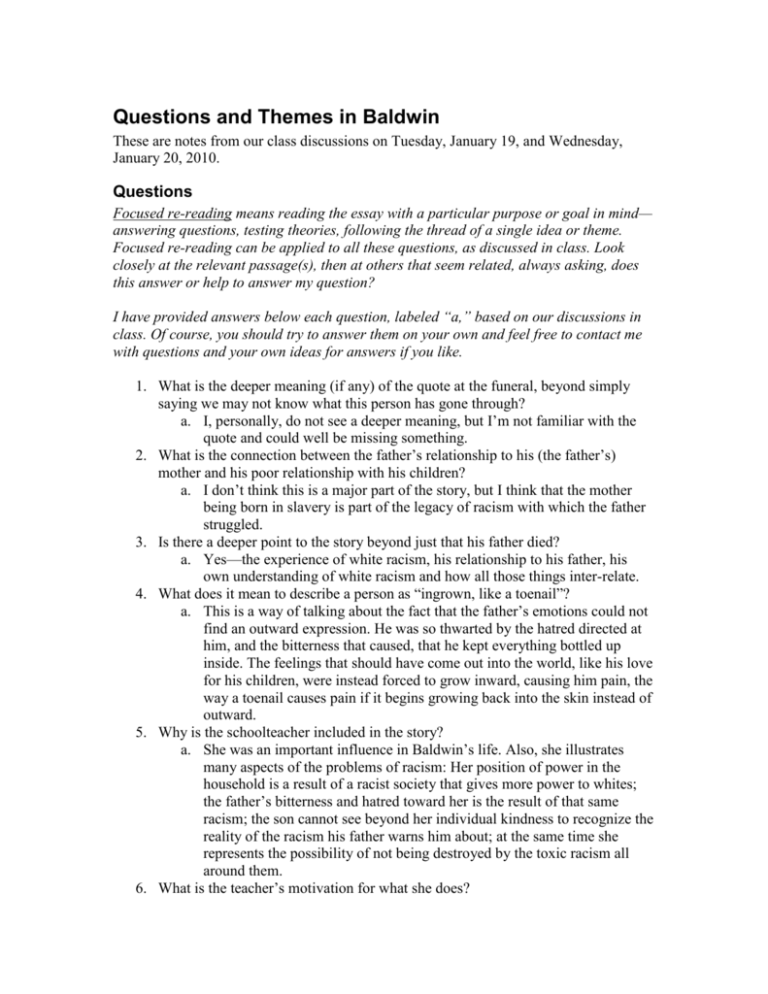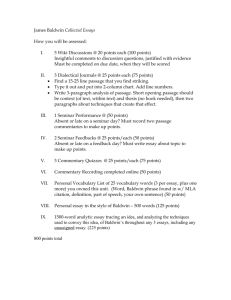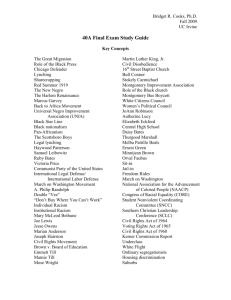1 - Shoreline Community College
advertisement

Questions and Themes in Baldwin These are notes from our class discussions on Tuesday, January 19, and Wednesday, January 20, 2010. Questions Focused re-reading means reading the essay with a particular purpose or goal in mind— answering questions, testing theories, following the thread of a single idea or theme. Focused re-reading can be applied to all these questions, as discussed in class. Look closely at the relevant passage(s), then at others that seem related, always asking, does this answer or help to answer my question? I have provided answers below each question, labeled “a,” based on our discussions in class. Of course, you should try to answer them on your own and feel free to contact me with questions and your own ideas for answers if you like. 1. What is the deeper meaning (if any) of the quote at the funeral, beyond simply saying we may not know what this person has gone through? a. I, personally, do not see a deeper meaning, but I’m not familiar with the quote and could well be missing something. 2. What is the connection between the father’s relationship to his (the father’s) mother and his poor relationship with his children? a. I don’t think this is a major part of the story, but I think that the mother being born in slavery is part of the legacy of racism with which the father struggled. 3. Is there a deeper point to the story beyond just that his father died? a. Yes—the experience of white racism, his relationship to his father, his own understanding of white racism and how all those things inter-relate. 4. What does it mean to describe a person as “ingrown, like a toenail”? a. This is a way of talking about the fact that the father’s emotions could not find an outward expression. He was so thwarted by the hatred directed at him, and the bitterness that caused, that he kept everything bottled up inside. The feelings that should have come out into the world, like his love for his children, were instead forced to grow inward, causing him pain, the way a toenail causes pain if it begins growing back into the skin instead of outward. 5. Why is the schoolteacher included in the story? a. She was an important influence in Baldwin’s life. Also, she illustrates many aspects of the problems of racism: Her position of power in the household is a result of a racist society that gives more power to whites; the father’s bitterness and hatred toward her is the result of that same racism; the son cannot see beyond her individual kindness to recognize the reality of the racism his father warns him about; at the same time she represents the possibility of not being destroyed by the toxic racism all around them. 6. What is the teacher’s motivation for what she does? a. We can’t really know the answer to this question, since Baldwin does not tell us and, I assume, she’s long gone. It might have been kindness, it might have been a desire to encourage a promising student, it might even have been a kind of pity, if she felt superior to her Black student and his family. 7. What was the purpose of writing the essay? a. There are many possible answers to this question. Answering it is part of your work in the expository essay. 8. What does “vindictively” mean? a. Mean and vengeful. 9. Did he feel angry towards white people before he went to NJ? a. No—he talks about this on page 132. 10. What really happened with the soldier? a. Baldwin does not get specific, but he does tell us that he did not die, and though he was shot, he was not shot in the back. 11. Did he get fired because they couldn’t accept him? a. Yes. The whole struggle in New Jersey was a result of the racism he encountered among his co-workers, bosses and others. It led to his being fired. 12. Why did he hate his father? a. His father was very bitter, “indescribably cruel in his personal life,” and incapable of showing love and affection. He had also experienced many failures, kept his children from the outside world, and had an anger toward whites that Baldwin could not, as a child, understand. At the same time, when the white teacher wanted to take Baldwin to a play, his father gave in, even though he did not like or trust her, and that seemed like weakness to Baldwin. 13. Was the father a black supremacist? a. We don’t have enough information to answer this question, and it would also require us to define “black supremacist.” I think it’s more useful to think of his father as having a deep-seated mistrust of and dislike for white people, born out of a long history of violent, systematic abuse in all aspects of life. 14. Why did the father detest Louis Armstrong? a. He considered jazz sinful and the scene that Armstrong came out of in New Orleans to be a hotbed of sin. 15. P. 133: What is the “chronic disease”? Is it a real disease or just an analogy or both? a. It’s an analogy—there’s no evidence in the essay that he thinks of it as a real disease. In this it is different from the father’s illness, which he describes unmistakably as an illness (in fact, two: tuberculosis and a “disease of the mind” which he does not define but may have been some form of schizophrenia). 16. What is the definition of “apocalypse”? a. Destruction of the world. 17. What is “Jim Crow”? a. “Jim Crow” is synonymous with segregation, a collection of laws and customs, mostly but not entirely in the South, that defined Black people as second-class citizens. It was a way of re-imposing white supremacy after slavery was abolished. 18. What is the relation between the father and the war? a. There is no direct relation that I can see. The indirect relation is the important one: People in Harlem and in other black communities around the country are, at the time the story takes place, growing increasingly upset, angry and afraid about the way their loved ones are being treated in the armed forces. The racism that has so heavily affected the father’s life is now being manifested in this new way, and the description of people coming together in Harlem reveals the effect of that racism on them, just as the essay elsewhere explores the effects of racism on the father. Themes A theme is a broad, abstract idea that appears in different forms throughout the essay, and that most if not all of the essay relates to in some way. Feel free to use any of these themes, if you feel they are valid themes, in writing your own Expository essay. Test them first: look to see if they are present in every part of the essay and if they appear in many different forms. For example, the theme of “death,” if it is a theme, should relate not just to Baldwin’s father’s death, but to other aspects of the essay as well. How does the theme of “death” relate, for example, to the whole issue of white racism that is such an important part of his essay? I’ve left these just as they appeared in the three different classes, with no attempt to edit or clean them up, so there is some overlap and repetition in the list. Bitterness Change Christianity/spirituality Culture of racism—what it’s like to be the oppressor and the oppressed Death Despair Differences Effects on a person of having to deal with the enormous injustices in the world Epiphany/realization/understanding Family; First generation vs. second. Fear Hatred How communities shape perceptions Personal growth Pride Race Racial discrimination Regret Religion Solitude/confinement Struggle with feelings: Hate, regret… Tension You don’t appreciate something until it’s gone




